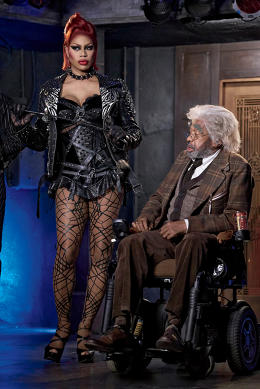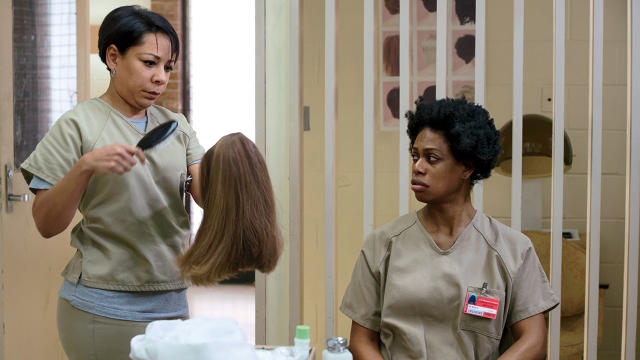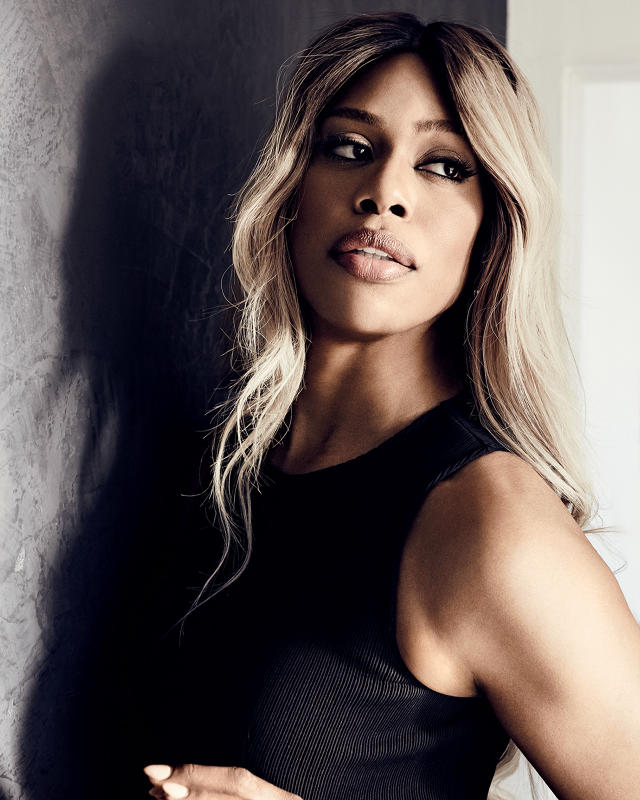This month, you’re starring in the TV remake of The Rocky Horror Picture Show. What drew you to the role of Dr. Frank-N-Furter, the “sweet transvestite from Transsexual, Transylvania,” which Tim Curry memorably played in the original?
I became obsessed with Rocky Horror when I was in college. I connected deeply to the message of the film; the song “Don’t Dream It, Be It” became a personal mantra. And Tim Curry’s iconic performance just transformed me. At the time, I was gender-nonconforming: I had a shaved head, and I wore false eyelashes and makeup, but I didn’t identify as female yet. So this movie and its gender fluidity were everything to me.

There’s a lot of singing in this role. How did you prepare for it?
I really started working on my [lower-range] chest voice again. For a long time, after I first discovered that I could sing really high, I exclusively sang in my head voice. I’ve met other trans singers who struggled with finding their voices during and after transition. Being comfortable with our voices is a really big deal. It wasn’t until about a year ago that I started accepting that I have a deep voice, too. And once I was ready to deal with that, the universe brought me something really spectacular: the role of Frank-N-Furter. Now I can sing a full octave range, and you get a taste of that in the movie.
When the legal drama Doubt airs next year on CBS, your character will be the first series regular on broadcast TV who is trans—and is actually played by a trans actor. Why has it taken so long for trans actors to break through?
For years, a lot of people in this industry didn’t think trans actors existed or had the talent to deliver when roles came along. There’s a business part, too. Sometimes you need a name just to get funding. And we have not until recently had any famous trans actors. But if you don’t cast trans people to play trans—or to play any role—then we don’t get the opportunity to become stars and amass the clout to carry a movie. It becomes a circle where we don’t get opportunities. I just wanted to get in the room, to have them see what I could do.
After the Civil Rights Movement, a lot of TV shows debuted—Julia, with Diahann Carroll, The Cosby Show—that helped challenge viewers’ stereotypes of African-Americans. Do you think your work has a similar effect?
I hope so. Frank-N-Furter is an alien from another planet [laughs], so Frank-N-Furter is not really reflective of the day-to-day realities of transgender people. With Doubt, my character is an attorney who is a black transgender woman and is fighting for the rights of others. Hopefully, it’ll encourage the public to see me in a new light, and maybe see trans people in a different light as well.
You are so symbolically important to people. When you’re making career choices, do you feel that you have to keep the trans community in mind?
I think about that, but I have to grow as an artist and push myself. So when it comes to decisions about playing a particular part, I really think about the challenge. I think about the humanity of the character, and who I might be working with on it. I try to keep artistic decisions out of the realm of the political. Though, certainly, it’s all political.
And you’re not shy about using your platform to fight for causes. You’ve drawn attention to transgender murders and taken a stand against LGBT–unfriendly laws. What motivates your activism?
I remember having a conversation years ago with my brother about this. I’m political anyway, so the question was: Do I speak up, do I speak out? [There had never been] a conversation in the mainstream media that challenged the ways in which trans stories were told. I wanted to change that, to create space for myself as a full, multi-dimensional human being, and hopefully give other trans people space to do that as well. A lot of it is just about seeing a need and speaking out, ’cause somebody’s gotta do it. It’s a civic responsibility.
You have been a vocal opponent of North Carolina’s HB2, the so-called Bathroom Bill, which forces individuals to use restrooms that match the gender on their birth certificate. We’ve recently seen large organizations like Target, PayPal, and the NBA join activists in protesting it. What does that signal to you?
I was very excited when I heard that the NBA was pulling the All-Star game from North Carolina. When people discriminate, there need to be consequences. There are over 100 anti-trans bills that have been introduced in the past year. One hundred. It’s really about scapegoating trans people during an election year to turn out a particular party electorate. It’s important that we push our own narratives, instead of all of the misinformation about trans people that folks want to try to perpetuate.

Free CeCe, a documentary you executive produced about a trans woman who spends a lot of time in solitary confinement in a men’s prison, had its world premiere in June. On the most recent season of Orange Is the New Black, your character spends a significant amount of time in solitary. Did you help develop that story line?
That was the writers. They had done the research, and when I got the script, I was like, Oh wow, here we go. My hope is that through Orange Is the New Black and Free CeCe, we can begin to have conversations about solitary confinement in this country. It’s cruel and unusual punishment and needs to be banned. Solitary can result in psychological and emotional effects for the rest of someone’s life—paranoia, hallucinations. Often people who have been in solitary are suicidal. Kalief Browder is a person I can’t help but think about. Do you know that story? [As a teenager, Browder spent years in solitary while awaiting trial at New York’s Rikers Island. He committed suicide two years after his case was dismissed.]
I do.
It’s so sad. When he got out after being in solitary for years, he lost the will to live.
Your character, Sophia, goes to a dark place while in solitary, really stripped-down physically and emotionally. How did you evoke that?
Obviously, I’d had conversations with CeCe over the years about her experience. It’s a scary place to go, because it has to be real for me—so that it’s real for the audience. You are stripping someone of something fundamentally human when they are not able to have human contact.
You’ve been open about a past suicide attempt.
Yeah, I’ve talked about that, yes.
Did you draw on that experience as well?
There have been times in my life when I certainly have wanted to end it, so yeah. As an actor, you shouldn’t tell all your secrets to the public. You have to have something for yourself to draw on. I tried to go into those places in my own history when I felt very isolated, and then worked to amplify those sensations, those states of mind.
What was it like for you growing up in Alabama?
It was a mixed bag. It’s important to note that the black community that I grew up in, in Mobile, was supportive of me as a good student who was talented. I studied dance, I did public speaking, I won a lot of talent shows. But I had to suppress my gender stuff and my femininity. I was bullied a lot, and I internalized a lot of shame around that. But I survived it. And everything that I went through has made me who I am today.
What inspires you?
I love excellence. Leontyne Price, who is an opera singer, is my idol. Her voice is so brilliant, but so is her work ethic, her discipline. On Facebook, I’ve been sharing videos of [1990s gymnasts] Dominique Dawes and Kerri Strug—that amazing Olympic moment when [Strug] vaulted and landed on one foot. You know the hours of work that went into that. It’s a grind, but there’s no substitute for just doing the work. There is something inspiring about that.

30-second bio: Laverne Cox
Hometown: Mobile, Alabama
Major acting credits: Orange Is the New Black (Sophia Burset), Grandma (Deathy), The Rocky Horror Picture Show (Dr. Frank-N-Furter), Doubt (Cameron Wirth), Freak Show (Felicia Watts)
First openly transgender person to: Play a trans regular character on a broadcast TV show, receive an Emmy nomination in an acting category, appear on the cover of Time magazine, or receive a wax figure at Madame Tussauds
On politics and the LGBT community: “We need to vote not only this year, but also in the midterm elections and particularly in 2020 when gerrymandered districts will be redrawn.”
A version of this article appeared in the October 2016 issue of Fast Company magazine.
Fast Company , Read Full Story
(22)